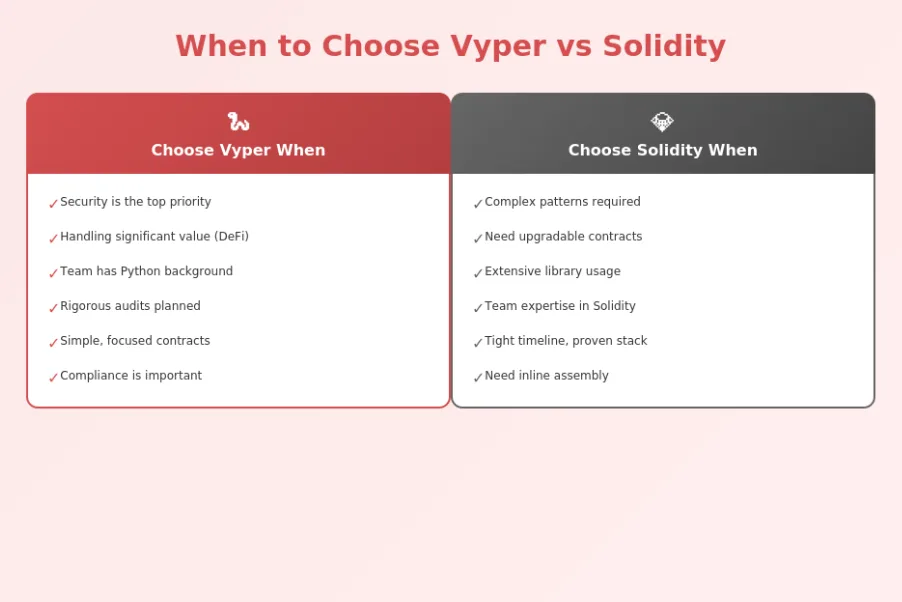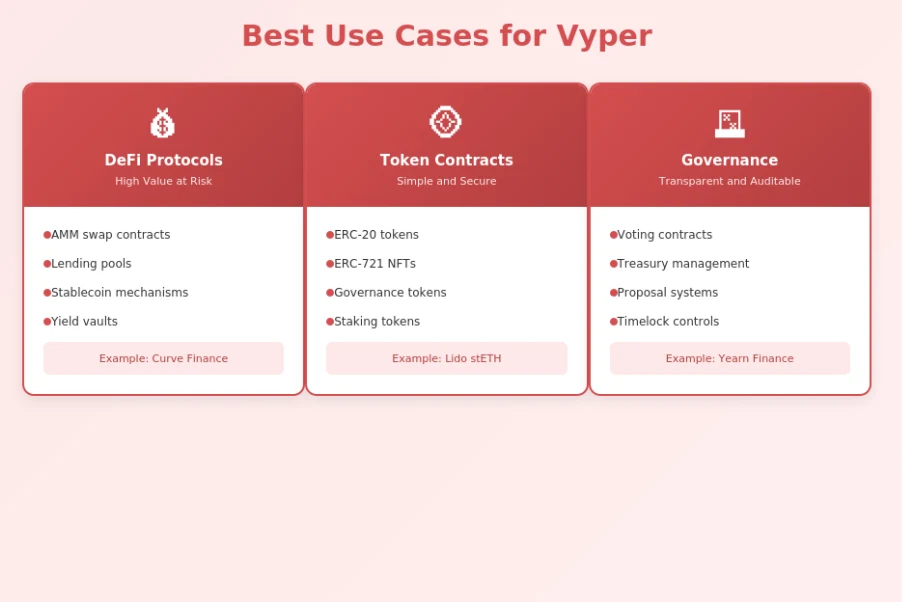Key Takeaways
- Vyper programming language is a Python-like smart contract language designed with security and simplicity as core priorities, ideal for Web3 projects handling significant value
- Vyper for Web3 projects eliminates entire vulnerability categories by design, including reentrancy attacks, infinite loops, and inheritance-related bugs
- Vyper smart contracts are easier to audit than Solidity equivalents due to simpler syntax, predictable behavior, and absence of hidden complexity like modifiers
- Vyper for Ethereum smart contracts powers major DeFi protocols including Curve Finance, demonstrating production-readiness at billion-dollar scale
- Vyper in Web3 provides predictable gas costs and cleaner bytecode, making contract behavior more transparent and cost-efficient
- The trade-off for Vyper’s security benefits is reduced flexibility: no inheritance, no inline assembly, and bounded loops limit certain design patterns
- Vyper blockchain projects benefit from compliance-friendly code that auditors and regulators can more easily review and understand
- Choosing between Vyper and Solidity depends on project requirements: security-critical financial logic favors Vyper, complex dApps may need Solidity’s flexibility
Understanding Vyper as a Smart Contract Language
The smart contract landscape offers choices beyond Solidity, and the Vyper programming language represents a fundamentally different approach to writing secure blockchain code. Understanding Vyper’s philosophy and design helps teams make informed decisions about when and why to use it for Web3 projects.
What Is Vyper and Why It Was Created?
Vyper emerged from the Ethereum ecosystem as a response to concerns about Solidity’s complexity and the vulnerabilities that complexity enables. Created to be a “Pythonic” smart contract language, Vyper prioritizes security and simplicity over feature richness. The philosophy is explicit: it’s better to do fewer things well than many things with potential for error.
The language was created by Vitalik Buterin and the Ethereum community specifically to address patterns that led to major exploits. By intentionally excluding features that introduce hidden complexity, Vyper for Web3 projects offers a cleaner foundation for contracts that handle real value.
Core Design Principles of Vyper
Vyper operates on three core principles: security, language simplicity, and compiler simplicity. Security means the language makes it difficult or impossible to write vulnerable code. Language simplicity means the syntax is minimal and readable. Compiler simplicity means the compilation process is transparent and predictable.
These principles manifest in concrete restrictions: no class inheritance (avoiding the diamond problem), no operator overloading (preventing confusion about what code does), no recursive calling (eliminating reentrancy by design), and bounded loops only (ensuring gas limits are predictable).
How Vyper Fits into the Web3 Ecosystem?
Vyper smart contracts compile to EVM bytecode just like Solidity, meaning they run on Ethereum and all EVM-compatible chains. Vyper contracts can interact with Solidity contracts seamlessly, enabling mixed-language projects where each component uses the most appropriate tool. This interoperability makes Vyper in Web3 practical for teams that want its benefits without abandoning existing Solidity infrastructure.
Important: Smart contract security is not just about the language chosen. Even Vyper contracts require thorough testing, auditing, and careful design. The language reduces certain risks but doesn’t eliminate the need for security practices.
Key Features That Make Vyper Suitable for Web3
Understanding Vyper’s specific features reveals why it excels for certain Web3 applications, particularly those where security and auditability are paramount.
Simplicity and Readability in Vyper Syntax
Vyper’s Python-like syntax makes code readable even for those unfamiliar with the specific language. Indentation-based structure, clear function definitions, and explicit type declarations create contracts that read almost like documentation. This readability isn’t just aesthetic; it directly impacts security by making code easier to review and reason about.
A simple token transfer in Vyper looks remarkably clean compared to equivalent Solidity. The lack of modifiers, multiple inheritance, and complex patterns means what you see is genuinely what you get. Auditors and reviewers can understand contract behavior without tracing through layers of abstraction.
Security-First Design Approach
Every Vyper design decision prioritizes security. The language includes bounds checking by default, preventing buffer overflows. Integer operations use safe math automatically, eliminating overflow vulnerabilities that have caused millions in losses. External calls are explicit and controlled, making interaction patterns clear.
The Vyper programming language also enforces reentrancy protection through its structure. Without recursive external calls possible, the entire class of reentrancy attacks that plagued early Ethereum (including the DAO hack) becomes impossible by construction.
Predictable and Auditable Smart Contracts
Vyper produces predictable bytecode with deterministic gas consumption. Since loops must be bounded and recursion is forbidden, gas costs can be calculated reliably. This predictability benefits both users (who know what they’ll pay) and protocols (which can design around known costs).
Organizations building professional crypto exchange platforms appreciate Vyper’s auditability for contracts handling user funds. The simpler the code, the more confidence auditors can have in their review.
Vyper vs Solidity for Web3 Projects

Comparing Vyper and Solidity directly helps teams understand the trade-offs and make appropriate choices for their specific requirements.
Security and Attack Surface Comparison
Vyper’s restricted feature set creates a smaller attack surface by construction. Features like inheritance, modifiers, inline assembly, and unbounded loops each introduce potential vulnerability patterns. By eliminating these, Vyper eliminates corresponding attack vectors entirely.
Solidity’s flexibility comes with responsibility: developers must actively avoid pitfalls that Vyper makes impossible. Experienced Solidity developers write secure code, but the language doesn’t enforce security the way Vyper does.
Learning Curve Comparison
For developers with Python backgrounds, Vyper feels natural immediately. The simpler language means there’s less to learn. For developers already fluent in Solidity or other C-like languages, Vyper requires adjustment but isn’t difficult.
The learning curve consideration extends beyond individual developers to organizational knowledge. Vyper’s simplicity means more team members can understand and review contracts, reducing single-point-of-failure risks on key personnel.
Performance, Flexibility, and Trade-Offs
Performance is roughly equivalent for most operations, though Vyper’s cleaner bytecode can offer minor gas savings. The real trade-off is flexibility: Solidity supports patterns Vyper explicitly forbids. Complex upgradability, proxy patterns, and certain gas optimizations require Solidity’s features.
| Aspect | Vyper | Solidity |
|---|---|---|
| Design Philosophy | Security-first, minimal | Feature-rich, flexible |
| Syntax Style | Python-like | JavaScript/C-like |
| Inheritance | Not supported | Full support |
| Inline Assembly | Not allowed | Fully supported |
| Ecosystem Size | Smaller, growing | Large, established |
| Best For | Security-critical DeFi | Complex dApps |
How Vyper Improves Smart Contract Security?
Security improvements from Vyper for Ethereum smart contracts are not just theoretical. The language’s design prevents specific vulnerability patterns that have caused real losses in production.
Preventing Common Smart Contract Vulnerabilities
Reentrancy, the vulnerability behind the DAO hack, is structurally impossible in Vyper because recursive external calls are forbidden. Integer overflow/underflow, which enabled numerous exploits, is prevented by default safe math. Unchecked external calls, which can silently fail, are explicit and require handling.
These aren’t edge cases; they represent some of the most common and expensive vulnerability categories in smart contract history. Vyper’s approach eliminates them at the language level rather than relying on developer vigilance.
Built-In Constraints That Reduce Risk
Bounded loops guarantee that contracts cannot enter infinite loops that consume all gas. No operator overloading means addition always means addition. No modifiers means function behavior is visible in the function body itself. Each constraint removes a potential source of confusion or error.
Why Auditors Prefer Vyper-Based Contracts
Security auditors consistently report that Vyper contracts are easier to audit than Solidity equivalents. The simpler language means less to analyze. The absence of hidden complexity (like modifier chains or inherited code) means auditors can be more confident they’ve reviewed all relevant logic. This typically translates to faster audits and higher confidence in findings.
Use Cases Where Vyper Works Best

Understanding where Vyper blockchain capabilities shine helps teams make strategic language choices for different components of their Web3 projects.
Vyper for DeFi and Financial Smart Contracts
DeFi represents Vyper’s ideal use case. Financial contracts handle real value where bugs mean real losses. The security guarantees matter most when money is at stake. Curve Finance, one of the largest DeFi protocols, built its AMM contracts in Vyper specifically for these security properties.
Lending protocols, stablecoin mechanisms, and exchange contracts all benefit from Vyper’s approach. The teams behind these protocols understand that the flexibility lost is worth the security gained when billions of dollars flow through the code.
Governance and Token Contracts Using Vyper
Governance contracts benefit from Vyper’s auditability because they define how protocols evolve. Token contracts, especially those representing significant value, gain from Vyper’s security guarantees. ERC-20 and ERC-721 implementations in Vyper are cleaner and easier to verify than Solidity equivalents.
When Vyper Is Not the Right Choice?
Vyper isn’t ideal for every situation. Complex proxy patterns for upgradability require Solidity. Projects needing extensive library reuse benefit from Solidity’s ecosystem. Highly optimized contracts using inline assembly need Solidity. Teams with strong Solidity expertise and tight timelines may not want to switch.
Language Selection Criteria
- Choose Vyper when: Security is paramount, handling significant value, simplicity aids correctness
- Choose Solidity when: Complex patterns needed, extensive library use, team expertise in Solidity
- Consider both when: Building hybrid projects with security-critical and complex components
Experience with Vyper
Understanding the practical experience of building with Vyper helps teams prepare for what to expect when adopting the language.
Writing and Testing Smart Contracts in Vyper
Writing Vyper feels natural for Python developers. The syntax is clean, type annotations are explicit, and the structure is straightforward. Testing follows familiar patterns using frameworks like Brownie or Ape that support both Vyper and Solidity, enabling gradual adoption.
Tooling, Compiler, and Framework Support
The Vyper compiler is mature and well-maintained. Brownie and Ape frameworks provide comprehensive testing and deployment capabilities. Titanoboa enables fast local testing. While tooling is less extensive than Solidity’s ecosystem, essential capabilities exist. Teams building comprehensive trading infrastructure find the tooling sufficient for production needs.
Integrating Vyper Contracts with Web3 Apps
Vyper contracts integrate with Web3 frontends identically to Solidity contracts. The ABI format is standard, and libraries like ethers.js and web3.py work seamlessly. From the frontend perspective, there’s no difference between calling Vyper or Solidity contracts.
Enterprise and Business Benefits of Using Vyper
Beyond technical merits, Vyper offers business advantages that matter for organizations building production Web3 applications.
Reducing Smart Contract Risk for Enterprises
Enterprise adoption of blockchain requires managing risk carefully. Vyper’s security-first design directly addresses this requirement. Simpler contracts mean fewer bugs, which means lower risk of exploits that damage reputation and finances.
Compliance-Friendly and Audit-Ready Code
Regulators increasingly scrutinize smart contract code. Vyper’s readable, auditable contracts make compliance reviews more straightforward. External auditors complete reviews faster with higher confidence. This audit-friendliness reduces both costs and time to production.
Long-Term Maintenance and Cost Efficiency
Simpler code is easier to maintain over time. New team members can understand Vyper contracts faster. Modifications are less likely to introduce bugs. These maintenance benefits compound over a contract’s lifecycle, providing ongoing cost efficiency.
| Phase | Stage | Vyper Advantage | Outcome |
|---|---|---|---|
| 1 | Design | Simpler patterns reduce complexity | Cleaner architecture |
| 2 | Build | Python-like syntax speeds writing | Faster implementation |
| 3 | Audit | Readable code, fewer patterns | Shorter audit cycles |
| 4 | Deploy | Predictable gas, clean bytecode | Reliable deployment |
| 5 | Maintain | Simple codebase, easy onboarding | Lower long-term cost |
Challenges and Limitations of Vyper
Honest assessment of Vyper’s limitations helps teams make informed decisions and prepare for challenges they may encounter.
Ecosystem Maturity and Community Support
Vyper’s ecosystem is smaller than Solidity’s. Fewer tutorials, examples, and Stack Overflow answers exist. The community, while helpful, is smaller. Teams may need to solve problems with less external guidance than they’d find for Solidity.
Feature Limitations Compared to Solidity
Vyper intentionally lacks features that some projects need. No inheritance means code reuse patterns differ. No inline assembly means certain optimizations are impossible. No unbounded loops means some algorithms need restructuring. These limitations are by design but constrain certain approaches.
Migration Considerations for Existing Projects
Migrating existing Solidity contracts to Vyper requires rewriting, not just porting. Patterns that rely on inheritance or modifiers need fundamental redesign. For established projects, this migration cost may outweigh Vyper’s benefits. New projects or major rewrites are better candidates.
When Should You Choose Vyper for Web3 Projects?
Strategic language selection requires matching project needs to language strengths. This section provides actionable guidance for the decision.
Project Types Best Suited for Vyper
Vyper for Web3 projects excels in: DeFi protocols (AMMs, lending, stablecoins), token contracts (ERC-20, ERC-721), governance systems, simple escrow and payment contracts, and any contract where security justifies restricted flexibility. Projects handling significant TVL benefit most from Vyper’s security properties.
Decision Checklist for Language Selection
Ask these questions: Does the contract handle significant value? Is security the top priority? Can the functionality be achieved without inheritance? Does the team have Python experience? Will the contract undergo rigorous auditing? If most answers are yes, Vyper deserves serious consideration.
Balancing Security, Flexibility, and Speed
The optimal choice often involves using both languages strategically. Write security-critical components in Vyper while using Solidity for complex auxiliary functions. This hybrid approach maximizes security where it matters most while maintaining flexibility where needed.
| Factor | Favors Vyper | Favors Solidity |
|---|---|---|
| Value at Risk | High TVL, financial | Lower stakes |
| Complexity Needs | Simple, focused | Complex patterns |
| Team Background | Python experience | JS/Solidity experience |
| Audit Requirements | Rigorous, frequent | Standard review |
Hiring Vyper Experts or Partners
Finding the right expertise to build Vyper for Ethereum smart contracts requires understanding what skills and experience matter most.
Skills to Look for in Vyper Experts
Strong Vyper candidates demonstrate: Python proficiency (Vyper’s syntax is Python-based), deep understanding of EVM and gas optimization, security-first mindset aligned with Vyper’s philosophy, experience with DeFi patterns that commonly use Vyper, and familiarity with testing frameworks like Brownie or Ape.
Security and Audit Experience Requirements
Given that teams choose Vyper specifically for security, security expertise is essential. Look for experience with common vulnerability patterns, audit preparation and response, formal verification concepts, and understanding of DeFi attack vectors. Previous work on audited protocols demonstrates production readiness.
Choosing a Smart Contract Building Company
Partners building Vyper contracts should demonstrate: portfolio of deployed Vyper contracts, security audit track record, understanding of your specific use case (DeFi, tokens, etc.), and ability to integrate with existing systems. Teams creating professional exchange and trading platforms bring this comprehensive expertise across smart contract languages.
Build Secure Smart Contracts
Partner with experts in Vyper and secure smart contract architecture for your Web3 project.
Vyper represents a thoughtful approach to smart contract security that trades flexibility for safety. For projects where security is paramount, particularly DeFi protocols handling significant value, the Vyper programming language offers concrete benefits that justify its constraints. Understanding when and how to use Vyper, often alongside Solidity for different components, enables teams to build Web3 projects that are both functional and secure.
Frequently Asked Questions
Vyper is a Python-like smart contract language designed specifically for Ethereum with an emphasis on security, simplicity, and auditability. Unlike Solidity, Vyper intentionally excludes features like inheritance, modifiers, and inline assembly that can introduce complexity and hidden vulnerabilities. This minimalist approach makes Vyper contracts easier to audit and understand, though it offers less flexibility than Solidity.
Vyper’s main advantages include enhanced security through restricted features, Python-like readable syntax, predictable gas costs, and easier auditing. The language prevents common vulnerabilities like reentrancy by design and produces cleaner bytecode. These properties make Vyper particularly valuable for financial applications where security bugs can result in significant losses.
Yes, Vyper and Solidity contracts can interact seamlessly on Ethereum since both compile to EVM bytecode. A Vyper contract can call Solidity contracts and vice versa using standard external calls. Many projects use both languages strategically, writing security-critical components in Vyper while using Solidity for more complex auxiliary functions.
Vyper can be excellent for beginners, especially those with Python experience, due to its readable syntax and simpler language design. The restricted feature set means there’s less to learn initially. However, Solidity has more learning resources and community support. Beginners focused on security-first practices may benefit from starting with Vyper’s disciplined approach.
Vyper’s ecosystem is smaller but growing steadily. Tooling includes the Vyper compiler, Brownie and Ape frameworks, and improving IDE support. While Solidity has more tools, tutorials, and developers, Vyper’s community is active and security-focused. For production use, the ecosystem is mature enough, as demonstrated by major DeFi protocols running Vyper contracts.
Reviewed & Edited By

Aman Vaths
Founder of Nadcab Labs
Aman Vaths is the Founder & CTO of Nadcab Labs, a global digital engineering company delivering enterprise-grade solutions across AI, Web3, Blockchain, Big Data, Cloud, Cybersecurity, and Modern Application Development. With deep technical leadership and product innovation experience, Aman has positioned Nadcab Labs as one of the most advanced engineering companies driving the next era of intelligent, secure, and scalable software systems. Under his leadership, Nadcab Labs has built 2,000+ global projects across sectors including fintech, banking, healthcare, real estate, logistics, gaming, manufacturing, and next-generation DePIN networks. Aman’s strength lies in architecting high-performance systems, end-to-end platform engineering, and designing enterprise solutions that operate at global scale.







